1980's and Superstardom
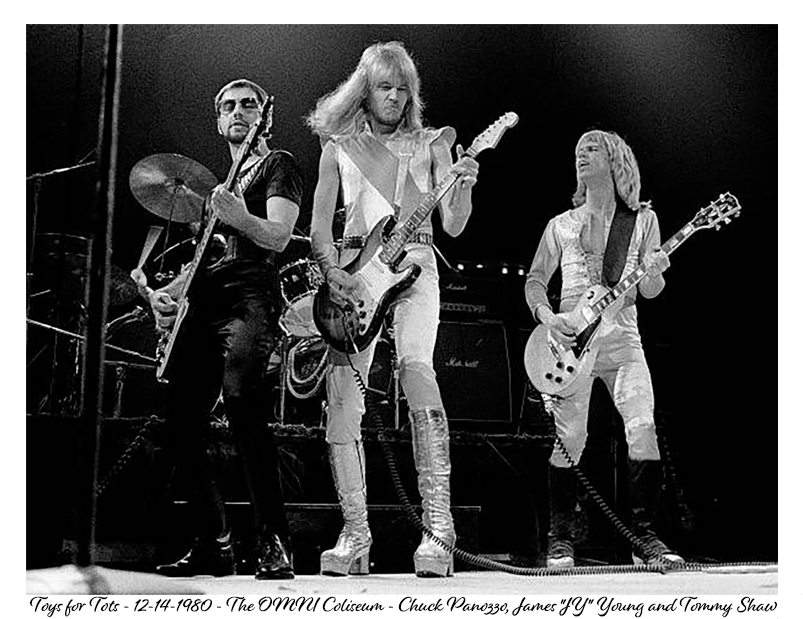
Paradise Theatre X studio album, released on January 16, 1981.
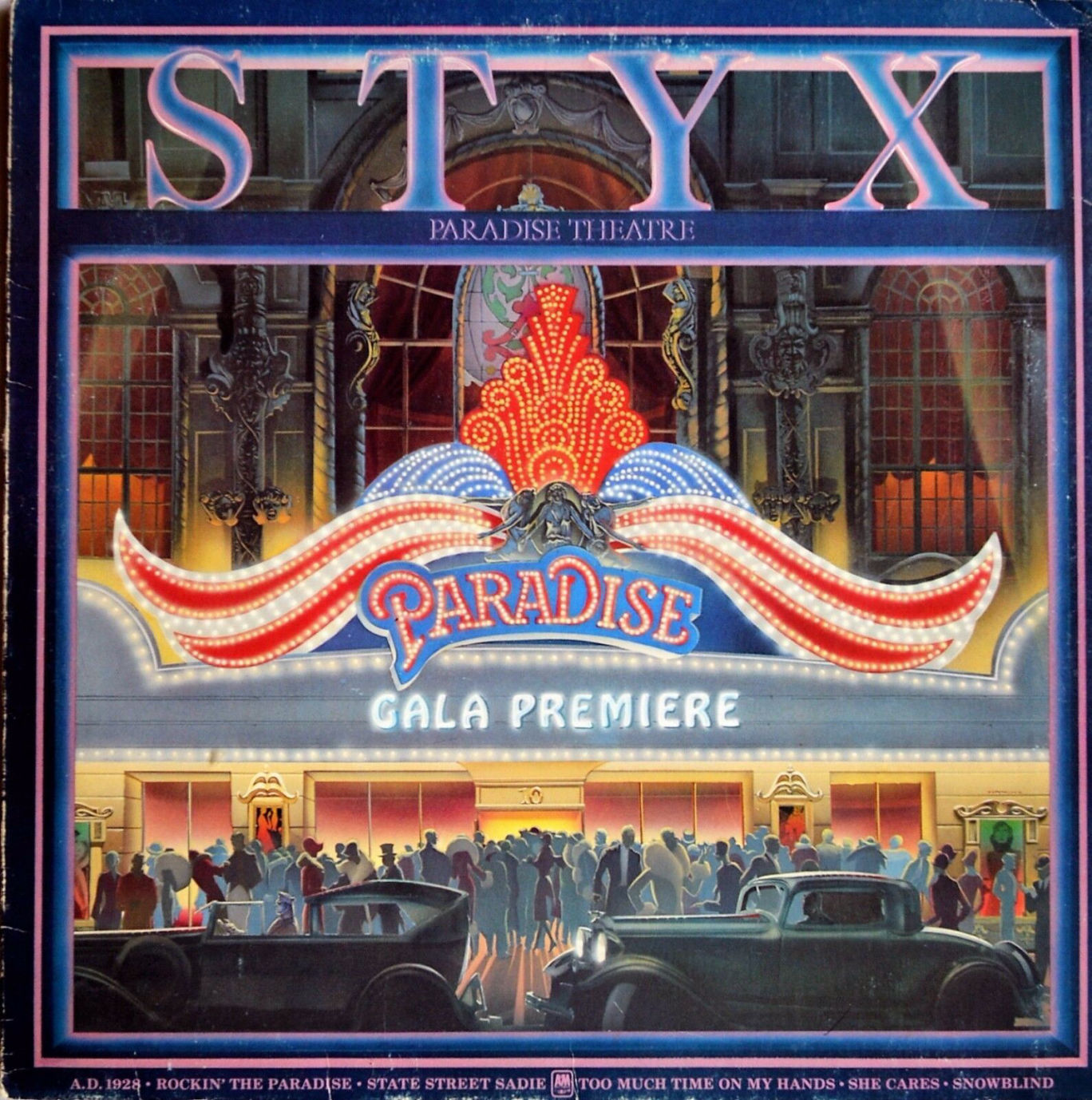
Initial vinyl copies of the album have a design featuring the name of the band laser etched directly onto the vinyl on side 2 (some copies had a wax design of the cover art). The vinyl record sleeve was a gate-fold and was painted by the artist Chris Hopkins. On the back cover, label and spine, the title of the record is spelled "Paradise Theater", while on the front cover, the title is spelled "Paradise Theatre".
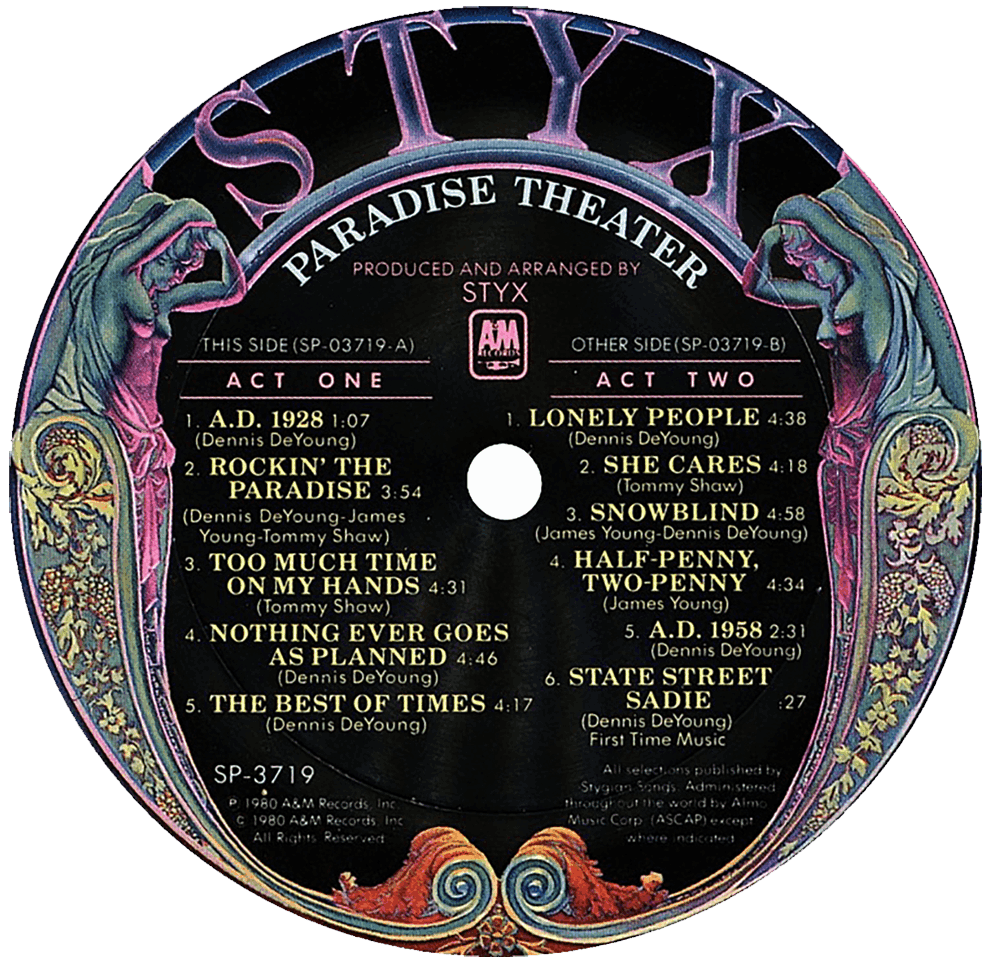
An ambitious year long world tour commenced in 1981 in support of the album and was one of the top grossing tours of the year. The tour had numerous Broadway and movie infused elements, including a dramatic opening featuring a theatre sweep and DeYoung by himself next to a player piano and the show ending with traditional movie credits. Throughout the tour and throughout the 1980s and beyond, the band would open their shows with "Rockin' the Paradise", the opening track from Paradise Theatre which charted at No. 8 on the Top Rocks Track Chart and whose music video would be among the first to air on the MTV cable channel.
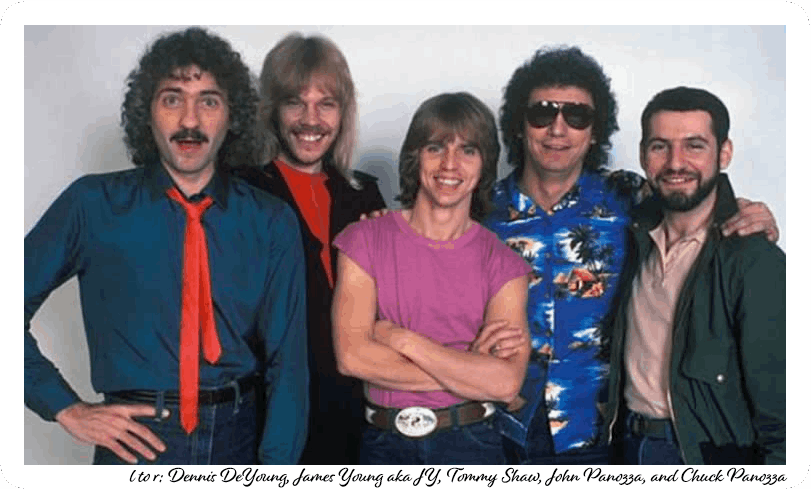
Live at Budokan
TS
Kilroy Was Here Xl studio album, released on February 22, 1983.
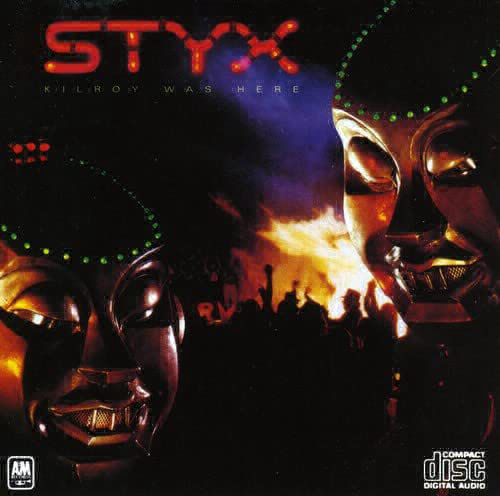
Disbandment (Why?)
Tommy Shaw Goes Solo...
Time Goes By Very Quickly
Though the 1980's eventually brought the decline of STYX, the decade began with the band riding a wave of commercial success with the #1 pop ballad "Babe" from their album, Cornerstone (1979), which was written by keyboardist Dennis DeYoung. However, tension mounted within the band as Shaw and other band members, preferring the rock direction of the songs written by Shaw and guitarist James Young, expressed dissatisfaction with DeYoung's desire to pull the band into a pop radio direction. Although the band had released singles and achieved airplay on pop radio, up until this point they had done so by sticking to their progressive/hard rock roots. But the planned release of "First Time," another ballad much in the same vein as the previous single "Babe" brought things to a head within the band. Shaw threatened to quit if "First Time" was released, worried that two ballads in a row would alienate Styx's rock fan base. DeYoung and the record company argued for release, but were out-voted by the band. For this reason, unbeknownst to the public, DeYoung was briefly fired from the group in early 1980 but quickly rehired, and the conflict would arise again.
Shaw's dissatisfaction continued to grow as DeYoung took more and more control of the band and their musical direction. Shaw had a lesser role on the theatrically-themed album Paradise Theatre, than he had on previous albums with the band, even though it featured a #9 hit by Shaw, "Too Much Time on My Hands" – his only Top 10 hit with STYX. Shaw's frustration in the band ultimately boiled over with the next album Kilroy Was Here. The concept of the album, along with its accompanying tour, was entirely the brainchild of DeYoung. The live shows featured an eleven-minute movie intro and theatrical performances with dialogue by the band. Shaw very much detested the whole project, and
this time around vetoed one of his own compositions,
"Haven't We Been Here Before" from being released as a single.
From the time Shaw joined STYX, up until the release of "Babe", Shaw had written and sung on six of the band's eight singles released in that period. Shaw released three solo albums
in the 1980s: Girls with Guns 1984, What If 1985, and Ambition 1987, scoring a
Top 30 hit with the title track and a minor hit with "Lonely School," both from the first album.
Shaw's solo band opened concerts for The Kinks in 1984 and for Rush in 1987 – 88.
Blue Collar Man (Long Nights)
Give me a job, give me security
Give me a chance to survive
I'm just a poor soul in the unemployment line
My God, I'm hardly alive
My mother and father, my wife and my friends
You see them laugh in my face
But I've got the power and I've got the will
I'm not a charity case
I'll take the long night, impossible odds
Keepin' my eye to the keyhole
If it takes all that to be just what I am
Well I'm gonna be a blue collar man
Make me an offer that I can't refuse
Make me respectable, man
This is my last time in the unemployment line
So like it or not, I'll take the
Long nights, impossible odds
Keepin' my back to the wall
If it takes all night to be just what I am
Well, I'm gonna be a blue collar man
Keepin' my mind on a better life
Where happiness is only a heartbeat away
Paradise can it be all I heard it was
I close my eyes and maybe I'm already there
I'll take those long nights, impossible odds
Keepin' my eye to the keyhole
All that to be just what I am
Well I'm gonna be a blue collar man
Do do do do do do do do
(You don't understand)
Do do do do do do do do
Do do do do do do do do
Do do do do do do do do
I'll take those long nights, impossible odds
Keepin' my eye to the keyhole
If it takes all night to be just what I am
I'm gonna be a blue collar
Got to be a blue collar
Gonna be a blue collar man
Written By: Tommy Shaw
I'm alive!